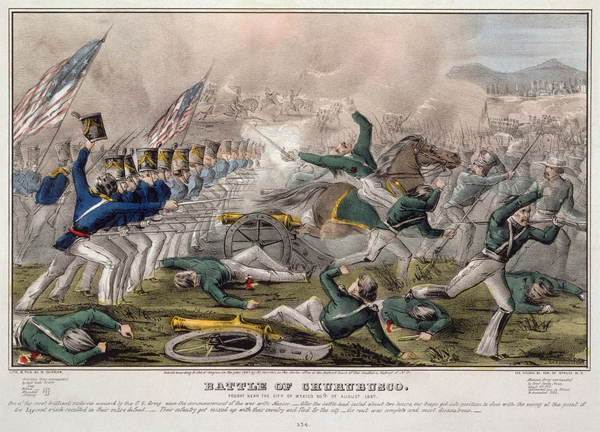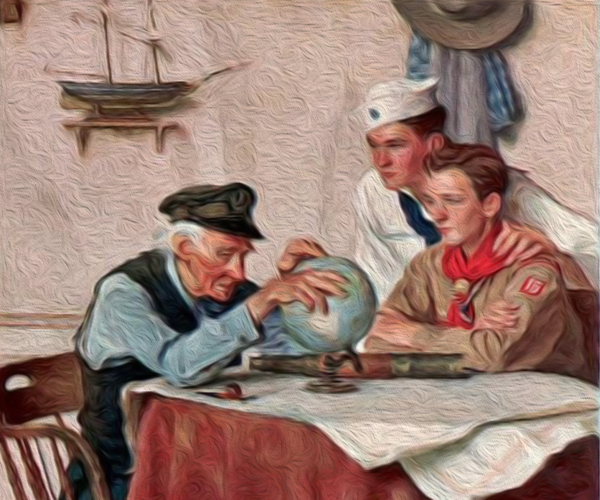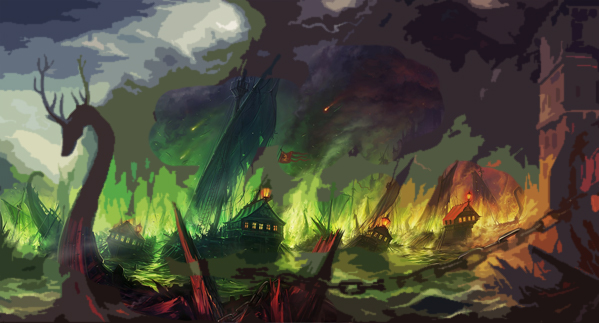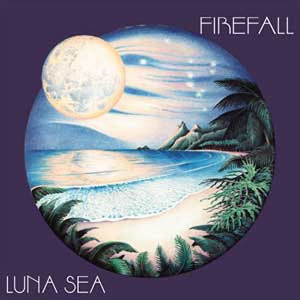
Scott captures Mexico City on September 14, 1847
Scott captures Mexico City: During the Mexican-American War, U.S. forces under General Winfield Scott enter Mexico City and raise the American flag over the Hall of Montezuma, concluding a devastating advance that began with an amphibious landing at Vera Cruz six months earlier.
The Mexican-American War began with a dispute over the U.S. government’s 1845 annexation of Texas. In January 1846, President James K. Polk, a strong advocate of westward expansion, ordered General Zachary Taylor to occupy disputed territory between the Nueces and Rio Grande Rivers. Mexican troops attacked Taylor’s forces, and on May 13, 1846, Congress approved a declaration of war against Mexico.
On March 9, 1847, U.S. forces under General Winfield Scott invaded Mexico three miles south of Vera Cruz. They encountered little resistance from the Mexicans massed in the fortified city of Vera Cruz, and by nightfall the last of Scott’s 10,000 men came ashore without the loss of a single life. It was the largest amphibious landing in U.S. history and not surpassed until World War II. By March 29, with very few casualties, Scott’s forces had taken Vera Cruz and its massive fortress, San Juan de Ulua. On September 14, Scott’s forces reached the Mexican capital.
In February 1848, representatives from the United States and Mexico signed the Treaty of Guadalupe Hidalgo, formally ending the Mexican War, recognizing Texas as part of the United States, and extending the boundaries of the United States west to the Pacific Ocean.
History Channel / Wikipedia / Encyclopedia Britannica / Library of Congress / PBS

Understanding Military Terminology - Multi-Service publication
(DOD) KC-135 aircraft equipped with external wing-mounted pods to conduct drogue air refueling, while still maintaining boom air refueling capability on the same mission. Also called MPRS. See also air refueling. Chairman of the Joint Chiefs of Staff Manual CJCSM 5120.01 (Joint Doctrine Development Process)

The Old Salt’s Corner
“Fire and Ice”
Some say the world will end in fire,
Some say in ice.
From what I've tasted of desire
I hold with those who favour fire.
But if it had to perish twice,
I think I know enough of hate
To say that for destruction ice
Is also great
And would suffice.
~ Robert Frost

“I’m Just Sayin”
“An epistemological principle maintaining that the burden of evidence in a debate rests on the claim-maker, and that the opponent can dismiss the claim if this burden is not met.”
~ Hitchens's razor

“Thought for the Day”
“There are two ways to be rich:
One is by acquiring much,
and the other is by desiring little.”
~ Jackie French Koller

“What I Have Learned”
“It is clear that he does not pray, who, far from uplifting himself to God, requires that God shall lower Himself to him, and who resorts to prayer not to stir the man in us to will what God wills, but only to persuade God to will what the man in us wills.
~ Thomas Aquinas

Bizarre News (we couldn’t make up stuff this good – real news story)

The game acknowledged the situation on Twitter.
Several possible explanations surfaced following the crash.
Gizmodo reported on a possible Distributed Denial of Service attack at the hands of a hacking collective known as PoodleCorp, which they said took credit for the incident.
Another possible cause, Kotaku speculated, was a bottleneck of new players signing on from 26 additional countries. Developer Niantic announced the additions in a Facebook post made several hours before the crash.
Forbes notes that the game had some instability shortly after release but that it “has since recovered, and has seemed pretty stable throughout the past week, a few crashes and other glitches notwithstanding.”
The unofficial Pokemon Go News Twitter account reported Saturday afternoon that the game is back up and running, with slow login times for some players.
Huffington Post (07/16/2016) 

Mr. Answer Man Please Tell Us: What's the Difference Between a Coffin and a Casket?
“Caskets! A vile modern phrase, which compels a person of sense and good taste to shrink more disgustfully than ever before from the idea of being buried at all.”
~ Nathaniel Hawthorne, Our Old Home
Though casket and coffin—the two terms for burial boxes—are used interchangeably by the American public at large, funeral industry insiders know that there is a difference between the two, and (to paraphrase Neil LaBute) it’s all in the shape of the things.
The word coffin evolved from the Old French word cofin, which originally meant “basket” but was later used to describe a sarcophagus. In North America today, a coffin refers specifically to a hexagonal funerary box that is somewhat tapered to fit the human body: wider at shoulder level and narrower down by the feet.
Overall, the system is a relatively recent construct. After the 1968 election, when Hubert Humphrey won the nomination without winning a single primary, the Democratic party sought to change its nomination process so it could be more inclusive. George McGovern, a senator from South Dakota, chaired the commission, which replaced the status quo—nomination by party bosses—in favor of more democratic processes, allowing more proportional representation in pledged delegates.
The word casket, on the other hand, was originally coined to describe an ornamental box used to hold jewelry or other precious items. By the mid-19th century in the U.S., however, the person who was once the local undertaker (who quietly buried the deceased without much fanfare) was now a funeral director, and as embalming technology progressed, so too did the business side of mourning. Every possible measure was taken to consider the sensibilities of the grieving family members and assuage their pain as much as possible. Thus, the traditional form-fitting coffin was deemed too morose for viewing purposes and was replaced by the four-sided, hinged-lidded, box-shaped burial vessel that we refer to as a casket.
The word casket didn’t have the negative connotation that was associated with coffin, or so went the thinking at the time. And once closed, the rectangular shape was found to be more comforting to mourners than a container shaped like a human body. The first citation in the Oxford English Dictionary for this new sense of casket shows the changing viewpoint: “The casket, which held this jewel, was worthy of it.” The jewel being a loved one.
Mental Floss
• I'm Sorry To Hear
• Casket - Coffin / Wikipedia

Where Did That Saying Come From?
“A nod, you know, is as good as a wink:” Meaning: To a person who is ready to understand or undertake something, any subtle signalling of it is sufficient. The context is usually of some undertaking that is borderline illegal or of sexual innuendo.
Origin: This proverbial saying sounds as if it might be quite modern but it is in fact a 16th century phrase originating in England. The longer version of the phrase is 'a nod is as good as a wink to a blind horse'. It might seem that this is just an elaboration of the shorter version, but it appears that the 'blind horse' version was in fact the original. The earliest examples of the proverb in print all give the fuller version, for example, in the Letters of the English lawyer and writer Joseph Ritson, February 1793:
A nod, you know, is as good as a wink to a blind horse.
It seems intuitive to interpret the longer version as meaning 'neither a nod nor a wink have any purpose, both being equally pointless'. Nevertheless, the context of the early uses have it being used with the same apparent meaning as the short version, that is, 'you may nod or wink - I will take your meaning either way'.
During the 19th century the expression began to be shortened and the blind horse was left at home. Citations from that period use the form 'a nod is as good as a wink etc.', which clearly indicates that the later usage was simply a shorthand way if writing the original.
More recently, the expression has gained currency in the form of “a nod is as good as a wink to a blind bat”, which Eric Idle used in his 'Nudge, nudge' sketch in Monty Python's Flying Circus. The character Idle played was a nonsense-talking fool who came out with a string of meaningless innuendos. The choice of bat was knowing, as bats are generally regarded as blind and so calling the creature a blind bat emphasized the ridiculousness of the character's gabble... and, before anyone writes in, I know that bats aren't really blind.
Phrases.org.UK


NAVSPEAK aka U.S. Navy Slang
Love Cookie: A deposit of semen left on a sailor's pillow.
LPOD: Last Plane On Deck: The time when all aircraft should be on the ground.
Love Boat: (1) A sub tender crewed primarily by female sailors; see also “Tuna Boat”. (2) Nickname for the CVN-69.


Just for you MARINE
MCCS: Marine Corps Community Services (also known by the humorous backronym Marine Corps Crime Syndicate)
MCMAP, MCNinja: Marine Corps Martial Arts Program.
MCT: Marine Combat Training, a infantry skills training for non-infantry Marines.
MCSF: Marine Corps Security Forces (Company) usually a company size unit assigned to the security of Naval assets. MOS 8152, MCSF School is at NSGA Northwest VA, and due to the intense marksmanship training Marines are known as 'Gunslingers', Marine Corps Super Friends

Naval Aviation Squadron Nicknames
HSM-49 - Helicopter Maritime Strike Squadron: “Scorpions”
Naval Air Station North Island, San Diego, California / Coronado, California

Science & Technology

Giant Asteroid Gave The “Man In The Moon” His Right Eye, Study Says
• Brain Map Identifies Nearly 100 New Regions
• Otters increasingly trafficked for their furs or for the illegal pet trade in Asia
• Ancient skeletons shed light on how early humans became farmers 10,000 years ago
• Myth buster: Women's periods do not really synchronise when they spend time together
International Business Times

The Strange, Mysterious or Downright Weird

A novelist who penned a story about a failed bank raid is to stand trial in Germany for carrying out a heist identical to the one he wrote about.
Like the character in his book the writer found himself struggling to make ends meet and so decided to rob a bank.
But like in the book, things didn’t go according to plan. On January 26 this year, in a district of Leipzig, he entered a bank wearing a mask and carrying a starting pistol.
He threatened staff and ordered customers to lie on the floor.
After getting the counter cash he ordered a teller to open the safe which was protected by a time delay system. After 25 minutes on the premise he fled with the euro equivalent of £32,000.
But the delay meant police were en route and arrested him as he got outside.
According to his defence lawyer, Stephan Bonell, the defendant will make a &ldull confession” when he comes to trial.
Mirror (07/22/2016) 


SONG FACTS

“Just remember I love you” - Firefall
Album: Luna Sea
Released 1977 
In this song, the singer tries to offer encouragement to someone who sounds chronically depressed and hopeless, perhaps suicidal. People who are going through their worst times ever have been known to identify with the lyrics.
This was written by Firefall singer Rick Roberts, who along with Larry Burnett was a main songwriter in the band. Interview with Larry Burnett.
Firefall official site / Billboard / All Music / Song Facts / Wikipedia
Image: “Luna Sea (album)” by Firefall

Trivia
● Three Great Greeks: Plato, Pythagoras and Socrates - ranked by oldest first: Pythagoras born 570 BC, Socrates 469 BC, Plato 428 BC.
● JOHN 23 / GREGORY 16 have been the two most common names of Popes.
● JIMI HENDRIX improvised a guitar arrangement of "The Star Spangled Banner" at the 1969 Woodstock Festival.

A Test for People Who Know Everything
These hard-working Indian people, who are called dhobis by profession, earn about $1 per day for their labor, but, since 1986, when a certain machine was introduced to India for the first time, their livelihood has been threatened. What do they do?
● Answer for People Who Do Not Know Everything, or Want to Verify Their Answer Wikipedia - Pakistan Dawn
Answer to Last Week's Test
Before it began to lean, the tower of Pisa was built to be what?
Answer: As a bell tower for the nearby cathedral; construction began in 1173. Tower of Pisa Historical Facts.org

Joke of the Day
A woman called our airline customer-service desk asking if she could take her dog on board.
“Sure”, I said, “as long as you provide your own kennel.” I further explained that “the kennel needed to be large enough for the dog to stand up, sit down, turn around, and roll over.”
The customer was flummoxed:, “I’ll never be able to teach him all of that by tomorrow!”
Pun of the Day
A mother squid gave birth and said, “I had an inkling.”


























